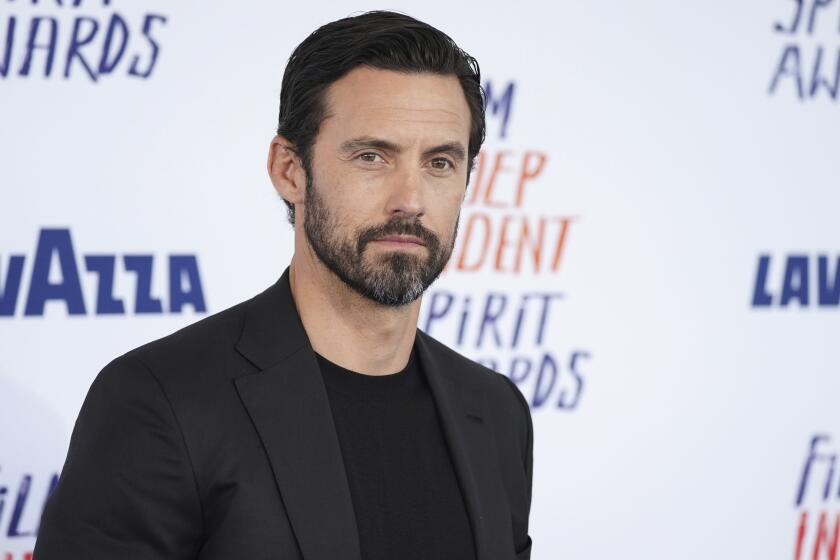Small Cinemas Screened Out of Major Releases
- Share via
The owners of Palm Desert’s posh Cinemas Palme d’Or thought they were a lock to get Universal Pictures’ “The Interpreter” when it opens this week.
In plain English, they were told to forget it.
Even though the independent multiplex had delivered the seventh-highest box-office gross in Southern California for Universal’s earlier release “Ray,” the Nicole Kidman thriller instead will play at a Century Theatres complex two miles away in Rancho Mirage.
For Steve Mason and his Cinemas Palme d’Or partners, it was a familiar story. Universal and other major studios routinely shut out the multiplex from screening major new releases, he said, to avoid damaging their Century relationship.
“There’s no way for us to compete when we have no movies,” said Mason, a host of “The Big Show With Mason and Ireland” on ESPN radio in Los Angeles.
Mason blames a common, and contentious, movie industry practice called clearance that has sparked a state antitrust probe. Big chains ask studios for exclusive screening rights within a certain radius around their theaters. Studios usually get better terms for all of the theaters if they agree.
But critics say clearance puts the nation’s dwindling independent theaters at a competitive disadvantage. They get Hollywood’s castoffs while big chains get the blockbusters.
“I’m the guppy in the shark tank,” said Robert Bucksbaum, owner of Westwood’s Crest Theatre. “And it’s feeding time.”
Tisha Shelden of the Baltimore-based League of Historic American Theaters blames clearance and the rise of chains for the overall decline of independent theaters. She estimates that thousands have been shuttered in recent decades.
“We don’t have numbers because most were owned by a local family and quietly closed,” she said.
Reacting to complaints from small-theater owners, including Cinemas Palme d’Or, California Atty. Gen. Bill Lockyer is investigating antitrust allegations that chains monopolize big-title films.
His probe was triggered last year by a similar controversy in San Jose. Executives from studios and theater chains have been questioned, said Lockyer spokesman Tom Dresslar.
“It’s an antitrust investigation,” Dresslar said. “Is [clearance] a reasonable business decision, or is it purposeful conduct to eliminate competition?”
Studios and theaters are loath to discuss clearance issues for fear of drawing heat, even more so with Lockyer investigating. Universal declined to comment, as did Century Theatres Inc. Chief Executive Raymond W. Syufy.
In a rare remark on the subject last year during the San Jose controversy, Syufy told the San Jose Mercury News, “It’s called competition.”
Industry experts say clearance is widespread, especially with the growth of chains and multiplexes.
“Clearance has been going on for more than 20 years as part of the discussion between distributors and exhibitors,” said USC cinema practice instructor Jason E. Squire, a former studio executive who edited “The Movie Business Book.”
Gitesh Pandya, editor of the website Box Office Guru, said clearance was used differently in different markets, which have varying populations and theater densities. Exclusivity can range in distance from many miles in the Midwest to a few city blocks in Manhattan, Pandya said.
“The basic idea behind it is when a distributor gives a film to one theater, the theater wants to make sure that an audience shows up,” he said. “If it’s played in a lot of other theaters nearby, that dilutes the audience.”
Other conflicts over clearance have been seen across the nation, including Baltimore’s Senator Theatre and Bucksbaum’s Crest in Westwood.
Bucksbaum bought the historic single-screen theater for $3.2 million in 2002, when it faced being converted into a swap meet. Built by Frances Seymour Brokaw, Henry Fonda’s second wife, the Crest opened as a legitimate theater in 1939 and began showing films in 1941. The refurbished movie house includes celestially aligned stars on its ceiling and murals of old Hollywood.
Bucksbaum made his fortune by creating a box-office data firm called ReelSource, which has 150 theater chains as clients. With those connections, he figured, getting films would be easy.
He misjudged. Surrounded by eight movie houses, he struggles to land the films he wants. To keep costs down, he sells tickets himself and pampers customers by putting quarters in their parking meters.
“I lose sleep at night,” he said. “Every night I think about the next movie that I’m playing.”
Likewise, Mason blames clearance for thwarting the big plans he and his three partners had when they bought a deserted multiplex in Palm Desert in 2003.
They spent $1 million refurbishing the theater, aiming to appeal to grown-ups with a mix of blockbusters, art-house fare, foreign films and documentaries.
But when the seven-screen Cinemas Palme d’Or opened in late 2003, they knew something was amiss.
Typically, movie studios give new theaters their pick of first-run films to help them jump-start their business. Cinemas Palme d’Or’s opening was scheduled to coincide with the release of Miramax Film Corp.’s “Kill Bill Vol. I,” Warner Bros.’ “Mystic River” and Universal’s “Intolerable Cruelty.”
“When none of those three came to us, we had a pretty good feeling [Century] was involved in making sure stuff didn’t come our way,” Mason said.
Mason and his partners thought all it would take was a major studio release to prove themselves. They lucked into “Ray,” Mason said, because of a personal connection he declined to specify.
Cinemas Palme d’Or has since struggled to land major films. Universal, Mason said, told Cinemas Palme d’Or it wouldn’t get any more big titles.
“They said the relationship with Century is too important and they couldn’t afford to damage it,” he said.
Mason’s nemesis is the 15-screen complex that Century owns at the River at Rancho Mirage shopping and entertainment complex. It’s part of San Rafael, Calif.-based Century’s system that includes more than 1,000 screens in 12 states, with 250 more screens to come over the next three years, according to the company’s website.
In contrast, Mason’s Flagship Theatres has 12 screens at two locations, in Palm Desert and near USC. For now, Mason said, the theater will try appealing to audiences with its eclectic mix of films. Recent titles include the Bobby Darin biopic “Beyond the Sea,” specialty film “Dear Frankie,” the foreign film “Downfall” and the documentary “Inside Deep Throat,” a Universal release. It also has midnight shows, including Stanley Kubrick’s “A Clockwork Orange.”
On a recent night, Palm Desert retirees Jack and Mary Howells were about to see the Woody Allen flick “Melinda and Melinda.” They said they visit the theater three or four times a month, drawn by the films and the sedate atmosphere.
But others gave the titles a blank stare.
“I haven’t heard of any of these movies,” said Rancho Mirage resident Pat Mitchell, 72. She then walked back to her car to drive to the Century complex.
More to Read
The biggest entertainment stories
Get our big stories about Hollywood, film, television, music, arts, culture and more right in your inbox as soon as they publish.
You may occasionally receive promotional content from the Los Angeles Times.











